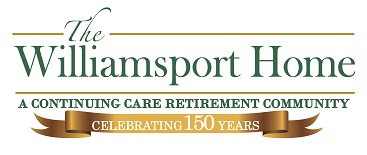Who Pays For Nursing Home Care?
The Williamsport Home Explains
The nursing home admission process can be overwhelming, especially when considering the emotional impact of placing your loved one in this new environment. The odds are high that you or someone in your family will need a nursing home sooner or later. Nursing home care is expensive, averaging upwards of $130,000 per year. While insurance and public programs may pay some of these costs in certain situations, some people who enter nursing homes begin by paying for their care out-of-pocket.
Medicare
Medicare generally does NOT cover long-term stays in a nursing home. Medicare Part A (Hospital Insurance) covers skilled care provided in a skilled nursing facility. Skilled care is nursing and therapy care that can only be safely and effectively performed by, or under the supervision of, professionals or technical personnel. It is health care given when you need skilled nursing or skilled therapies to treat, manage, and observe your condition, and evaluate your care. Medicare covers certain daily skilled care services but only on a short-term basis and only under certain circumstances.
There are two different ways to access your Medicare coverage benefits in a nursing home:
- Traditional Medicare and Medicare Advantage Plan. Traditional Medicare requires an individual to have a three-day hospital stay immediately prior to being transferred to a skilled nursing facility. When skilled care is needed, the beneficiary may be entitled to a maximum of 100 days of Medicare coverage. Some individuals falsely believe that they automatically receive 100 days of coverage. In order for your stay to be covered under traditional Medicare, the individual must be receiving a daily skilled service and making progress toward functional improvement. Usually, the first 20 days of Medicare skilled care is paid in full by Medicare while skilled care provided between days 21-100 is subject to a co-pay. The co-pay may be offset by an individual’s supplemental Medicare insurance or other private health insurance, if available. An individual may receive care in more than one nursing home under the same benefit period that does not always run concurrently so it is important to alert the nursing home of prior hospital and nursing home stays in the past year and ask the nursing home how many available days you have at the time of admission and what benefit day you are receiving.
- Medicare Advantage Plans. These plans, such as HMOs or PPOs, combine your Medicare Part A and Part B coverage into one insurance plan when elected in lieu of traditional Medicare. This type of Medicare plan will often provide beneficiaries with additional benefits not available through the traditional Medicare program, such as dental, vision, hearing, and pharmacy benefits. But, these types of plans often require nursing homes to have a contract with the insurance provider which can sometimes limit access to non-contract nursing homes. Medicare Advantage Plans also more actively manage the care of its beneficiaries, which can limit not only the health care setting but also the amount of services received.
Once an individual’s Medicare coverage ends, nursing home care will often be financed through one of the following options depending on your individual situation:
- Personal resources, such assets and savings,
- Long-term care insurance or
- Medicaid.
Personal Resources
Individuals who do not qualify for care under their Medicare benefit or financially qualify for Medicaid use their personal resources to pay for nursing home care. Checking and savings accounts, pensions, retirement income, stocks, bonds, and the sale of assets are a variety of means that individuals often use to fund a nursing home stay.
Long-Term Care Insurance
Additionally, some long-term care insurance policies may provide assistance in paying for nursing home costs, both skilled care and non-skilled care. Each policy can vary widely in what they cover. Some pay for some aspects of nursing home care while others may include coverage for services in other settings, such as personal care homes, adult day care, or home care. Each policy is different and it is best to contact your insurance provider to understand your individual coverage before you need care.
Medicaid
Medicaid will pay for nursing home care for individuals with limited income and resources. Most nursing homes accept Medicaid payment. If you qualify for Medicaid coverage, most of the costs of your care in a nursing home will be covered by the program. Medicaid includes payment for room and board, as well as all necessary medical and non-medical goods and services. These can include skilled nursing care, physician’s visits, prescription medication, medication management, mental health counseling, social activities and assistance with Activities of Daily Living (eating, bathing, moving, dressing and using the bathroom).
There are some things that the Medicaid program won’t cover in a nursing home, such as a private room, specialized food, comfort items not considered routine (sweets and cosmetics, for example), personal reading items, plants, flowers, and any care services not considered medically necessary.
Those covered under the Medicaid program must contribute to the cost of their care with any resources available, such as pension and social security. The program allows each beneficiary to keep a small portion of their income for personal items that are not covered by the Medicaid program, but requires the remainder to be contributed toward the cost of care.
In addition to meeting the financial eligibility requirements, an individual will also have to meet the program’s clinical eligibility. The individual must require a Nursing Facility Level of Care, which means that the care needed is medically necessary and can only be provided in a nursing home setting. The Area Agency on Aging will conduct an assessment to determine whether an individual qualifies for care under the program. There is no cost associated with the assessment but it is a required part of the Medicaid application process.
Honorably discharged veterans who served in our armed forces and who need nursing home care may qualify for care through the VA system. There are some eligibility and enrollment requirements based on income, disability level and geographic location. Additionally, there are often limitations on where nursing home care can be accessed through the VA benefit.
Individuals at the end-stages of their disease process may also qualify for care under their hospice benefits. Typically, hospice is reserved for those who are terminally ill with a life expectancy of six months or less. If qualified, hospice benefits typically cover care for the terminal illness and any related conditions. You can receive hospice care in the nursing home setting, room and board while on hospice benefit will be paid privately or under Medicaid.
Understanding the various ways one can finance care in a nursing home can be overwhelming and confusing, particularly on top of the emotional stress involved in choosing the right nursing home. According to the Centers for Medicare and Medicaid, almost 40% will seek nursing home care in their lives. Planning ahead will relieve some of the overwhelming burden.
Our staff at The Williamsport Home can answer questions and help guide you when a nursing home need arises. We have a long-standing tradition of caring by providing compassionate service for nearly 150 years to the greater Lycoming County community.
Sitting on an 86-acre wooded campus in Loyalsock Township overlooking the city of Williamsport, our Continuing Care Retirement Community offers Independent Living Apartments, individualized Personal Care programs, Skilled Nursing Care, Short-term Rehabilitation, a secured Memory Care unit, as well as End of Life Suites/Comfort Care Services.
At The Williamsport Home, we are a home away from home – a neighborhood caring for neighbors. We consider you a part of our family. Schedule a visit to learn more about the difference that The Williamsport Home can make in your life or in the life of your loved one. Talk to our admissions team about care for your loved one, 570-323-8781.

